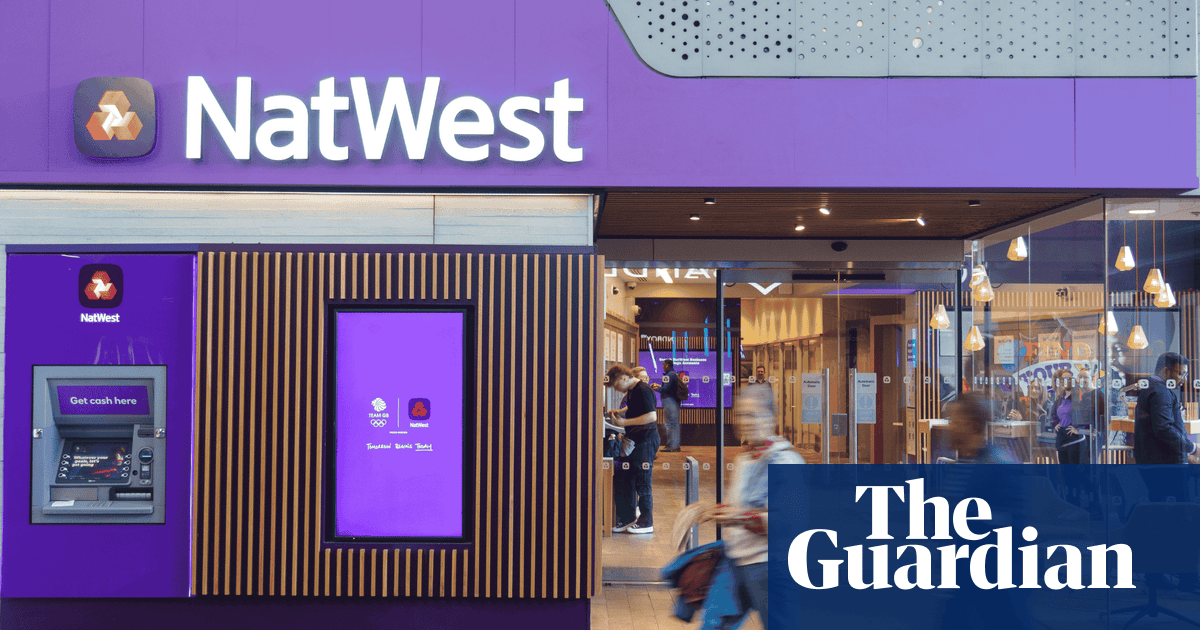The UK has sold its final shares inNatWest Group, ending 17 years of state ownership since the £45bn taxpayer bailout that saved the bank from collapse at the height of the 2008 financial crisis.
The full privatisation of NatWest is a symbolic moment for the banking group – formerly known asRoyal Bank of Scotland(RBS) – and draws a line under the most tumultuous chapter in its near 300-year history.
However, it comes at a £10bn loss to the taxpayer, with the state having only recouped about £35bn of its costs, because its shares have long languished below the average 502p level paid in the bailout.
That compares with the £900m profit recouped from the sale of shares in LloydsBankingGroup, which was privatised in 2017 nine years after receiving £20.3bn in state aid for rescuing HBOS during the banking crash.
The Treasury said that while it did not recover the entirely of the RBS bailout bill, “the alternative would have been a collapse with far greater economic costs and social consequences,” shattering confidence in the UK’s financial system and putting savings and livelihoods at risk.
Chancellor Rachel Reeves, said: “Nearly two decades ago, the then-government stepped in to protect millions of savers and businesses from the consequences of the collapse of RBS.”
“That was the right decision then to secure the economy and NatWest’s return to private ownership turns the page on a significant chapter in this country’s history. We protected the economy in a time of crisis nearly seventeen years ago, now we are focused on securing Britain’s future in a new era of global change.”
The government has now exited all of the banks it helped bail out during the financial crisis, the Treasury said.
RBS became a symbol of the UK banking sector’s implosion during the 2008 global financial crisis, with public ire focusing on itsaggressive expansion under the former chief executive Fred “The Shred” Goodwin. Goodwin was later stripped of his knighthood in 2012, but is now estimated to be receiving a pensionworth nearly £600,000 per year.
In 2007 RBS led a consortium to buy the Dutch bank ABN Amro for £49bn – a huge sum at the top of the market. It was then the largest deal in financial services history, and for a short period made RBS the world’s biggest bank. With £2.2tn in assets, it was more than double the size of the UK economy.
Executives’ excessive spending, which extended to private jets and a lavish £350m campus outside Edinburgh, also stretched the bank’s finances just as the sector was facing a credit crunch.
RBS was eventually forced to take a state bailout in October 2008, with the taxpayer eventually injecting £45bn into the lender, without which millions of customers’ savings would have been put at risk.
It left the government with an 84% stake in the banking group, leading to years of government austerity that many blame for hollowing out public services across the country.
Sign up toBusiness Today
Get set for the working day – we'll point you to all the business news and analysis you need every morning
after newsletter promotion
RBS, for its part, was forced to cancel bonuses and begin a long turnaround that involved slashing tens of thousands of jobs, shrinking its investment bank, and pulling out of almost 50 countries to become a UK-focused lender.
It finally returned to profit in 2018, but ditched the toxic RBS name in 2020, rebranding the group – and its branches in England and Wales – as NatWest.
The government started to recoup its costs through dividends paid out by the lender, and slowly sold its shares through a combination of sales to institutional investors and a drip-feeding of stock into the open market. NatWest alsofast-tracked the processthrough multibillion-pound share buybacks.
That process is now completed, bringing NatWest back into full private ownership nearly two decades after taxpayers saved it from the brink.
NatWest chief executive, Paul Thwaite, said: “This is a significant moment for NatWest Group, for all those who work here and for the UK more widely. As we turn the page on the financial crisis, we can look to the future with confidence, without forgetting the lessons of the past.”
